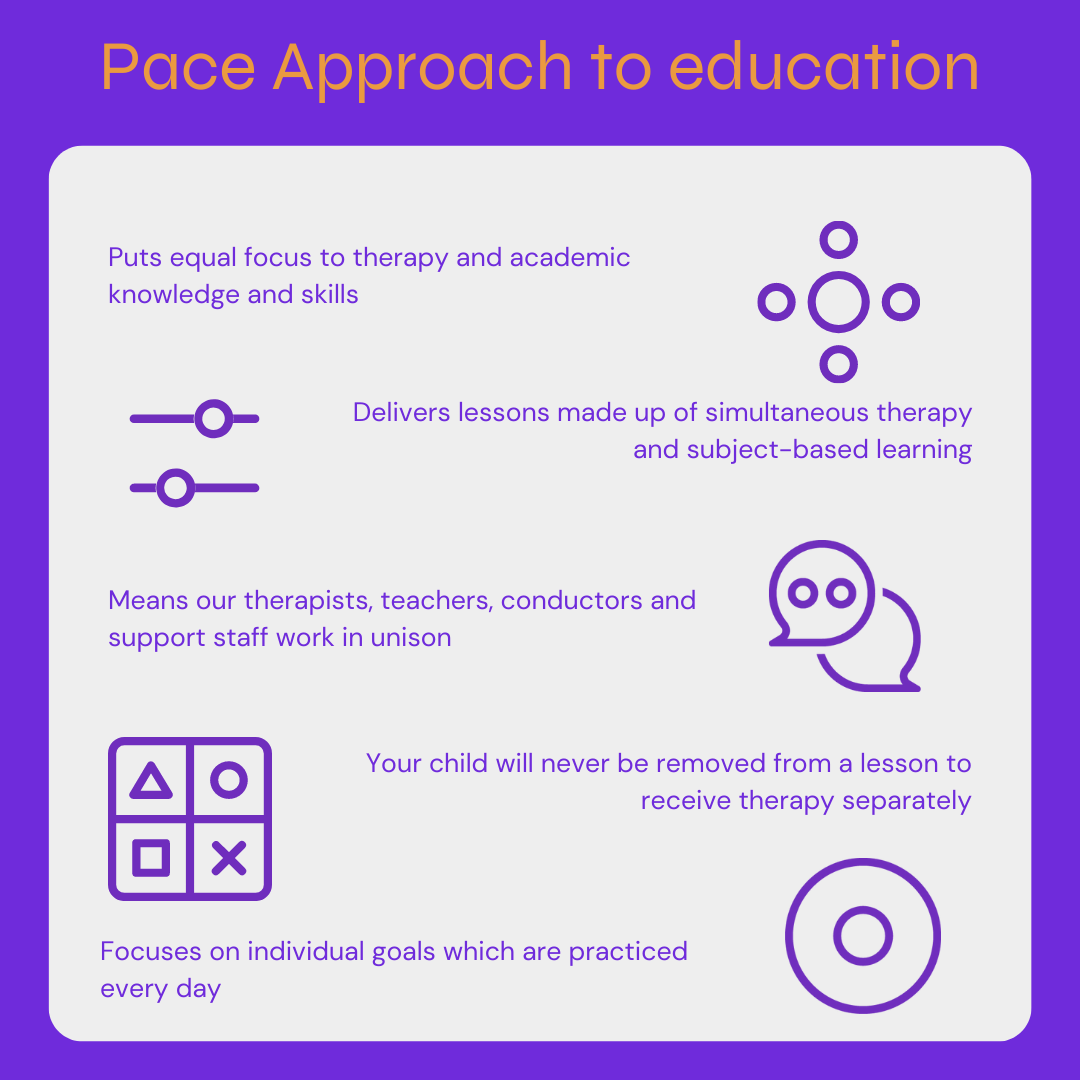Our approach
How does it work?

How does it work?
Transdisciplinary teams
At Pace School, we work in transdisciplinary teams. It means all our teachers, conductors, occupational therapists, physiotherapists, speech and language therapists and classroom assistant work collaboratively. Every member of the team has a skill set which extends beyond their own specialism.
What does ‘transdisciplinary’ working mean for your child?
Your child is at the heart of a cluster of experts
Therapists collaborate and cooperate to provide bespoke care
Staff step outside normal parameters of their specialism to support and teach each other
The care your child receives will be completely focussed on their needs
Your child will achieve their unique potential
Your child’s whole development
“The Pace centre is a learning community of the highest calibre. The quality of education here is first class.”
Your child’s day
A typical day might include:
- Opportunities to work on self-care, independence, safe eating and drinking.
- A morning lesson which focuses on movement, motor control and body awareness.
- Engaging group lessons which combine several of the nine curriculum areas with a subject area focus such as literacy, numeracy, science, history, geography, art, music, Personal, Social, Health and Citizenship Education (PSHCE) and Religious Education (RE).
- Opportunities to practice independent mobility including wheelchair skills.
- Spontaneous and planned communication sessions using both low tech and high tech equipment.
- Individual activities to focus on key skills, assess progress and explore and adjust equipment.
- Activities to develop fine motor control and smaller graded movements.
- Opportunities to play, have fun with friends, express opinions and develop confidence and identity.
Achievement and accreditation
All pupils in our secondary provision may take part in the WJEC/Eduqas qualification, which is suitable for young people with special educational needs. It offers a nationally-accredited way to record and celebrate skills and achievement. We ensure that all our pupils are able to work towards appropriate qualifications, regardless of which class or year group they are in. Pupils will be carefully matched to qualifications based on their individual academic needs. The two qualifications that we currently offer are ‘Essential Skills for work and life’ and ‘Personal progress’.
“Staff strike the right balance in nurturing pupils so that they believe in their own capabilities and confidently have a go themselves.”
Smart classrooms
Our aim is to become the UK’s first genuinely smart special school, using technology to help children be as independent as possible. Our smart classrooms use the latest equipment, such as:
- Cutting edge, AI-enabled classroom accessibility for our students
- Fully accessible doors, cupboards and worksurfaces
- Sensory classrooms – incorporating music, projection and lighting systems
- Best practice hardware and software to enable children to access the curriculum and record their learning
Safeguarding your child
We are committed to the safety and wellbeing of every Pace student. You can read our Child Protection Policy by clicking the link below. This explains how we safeguard our students, and the processes in place to follow up where there is concern for a child’s welfare.
At Pace School, we are aware of the high level of support our students need – particularly in relation to personal/intimate care, physical facilitation and when transferring to equipment and positions. It’s vital that we have an environment where children and young people understand their right to say ‘no’, and have opportunity to exercise this right.
Staff at Pace School know students well, and use their expertise and positive relationships to closely monitor any changes in behaviour which may indicate any cause for concern.
“They feel safe and their big smiles show how happy and settled they are. Relationships between staff and pupils are warm, trusting and highly respectful.”
Important information
Interested in a school placement?
Email us to arrange a tour of the school – click the button below
